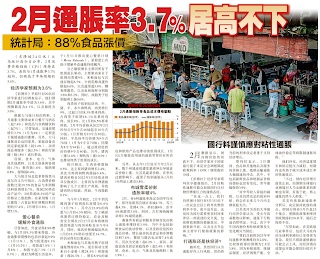Let's talk about inflation
Have you felt the pain in your wallet since the last year 2022 and especially more pain in the past few months? You are not alone. That is inflation impact and I want to be exact, high inflation rate impact. Let me share my notes with you.
What is Inflation?
Inflation is a general increase in the prices of goods and services over time. This means that as time goes by, the cost of the things we buy (like food, housing, and clothing) gradually increases. This can happen for various reasons, but usually, it occurs when the amount of money in the economy grows faster than the number of goods and services available for purchase.Governments and central banks often try to manage inflation to keep it under control, because high inflation can lead to economic instability and harm the purchasing power of individuals and businesses.
Why so much money in the economy?
There can be many reasons why there is more money in the economy. One common reason is when the government, Bank Negara Malaysia, decides to increase the money supply by printing more money or lowering interest rates. This can make it easier for businesses and individuals to borrow money and spend more, which can stimulate economic growth. Do you remember that our government allow us to withdraw from our EPF during the pandemic? Did you remember that some of you temporarily stop paying for your housing loan during the pandemic? You are right, those actions will release more money into the economy and drive up inflation.Good or Bad?
Inflation can bring about certain advantages to the economy. It can encourage people to spend and invest their money, which can potentially lead to economic growth. Furthermore, a moderate level of inflation can motivate businesses to expand their production and hire more workers, ultimately lowering unemployment rates. In addition, inflation can increase the value of assets, such as real estate and stocks, which can offer benefits to investors.Inflation can have negative effects on the economy as well. High inflation can lead to a decrease in purchasing power, as the cost of goods and services increases faster than people's income. This can lead to a decrease in consumer spending and overall economic growth. Inflation can also lead to higher interest rates, making it more expensive for people and businesses to borrow money. Additionally, inflation can cause uncertainty and instability in financial markets, making it difficult for investors to make informed decisions. Finally, inflation can disproportionately impact low-income households and those on fixed incomes, as they may struggle to keep up with rising prices.
How to overcome it?
If you are categorised as T20, who has the advantage of having more disposable income to invest in various asset classes. To protect yourself from the negative impact of inflation, consider diversifying your investments by investing in a mix of stocks, bonds, real estate, and other alternative investments. Finally, it's important to regularly review and rebalance your portfolio to ensure that it remains aligned with your financial goals and risk tolerance.If you are categorised as M40, you may have fewer resources to invest, but there are still ways to protect yourself from inflation. You can consider investing in low-cost index funds, which offer a diversified portfolio of stocks and bonds. Finally, it's important to prioritize saving and investing regularly, even if it's only a small amount each month, as the power of compound interest can help your investments grow over time.
If you're classified as B40 and have limited resources to invest, it's crucial to focus on reducing your debts to a minimum and discipline yourself to spend within your budget. Although it's challenging, it's still important to set aside a small amount for savings. Building a strong mindset to save and invest can positively impact your financial future.








Comments
Post a Comment